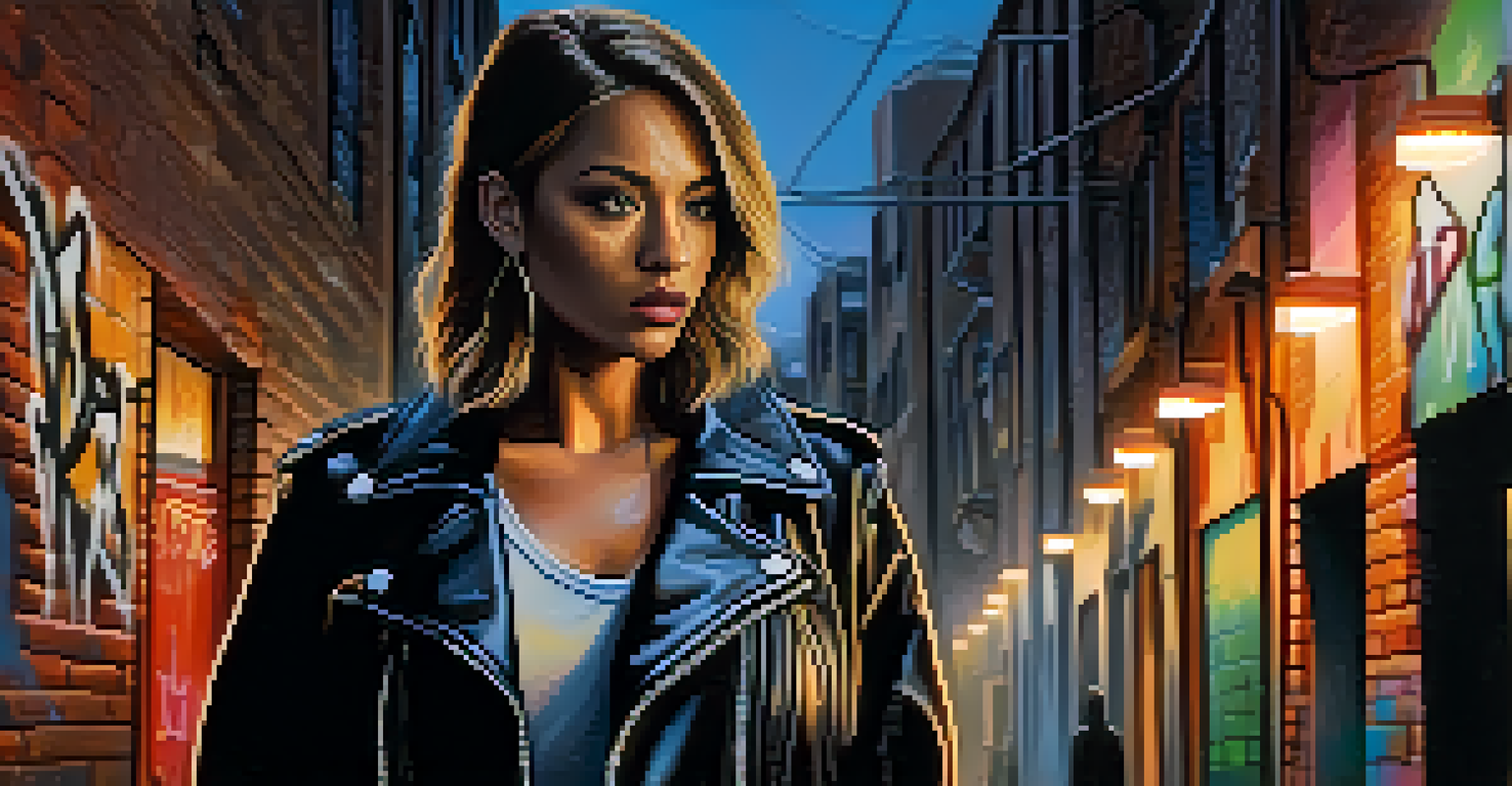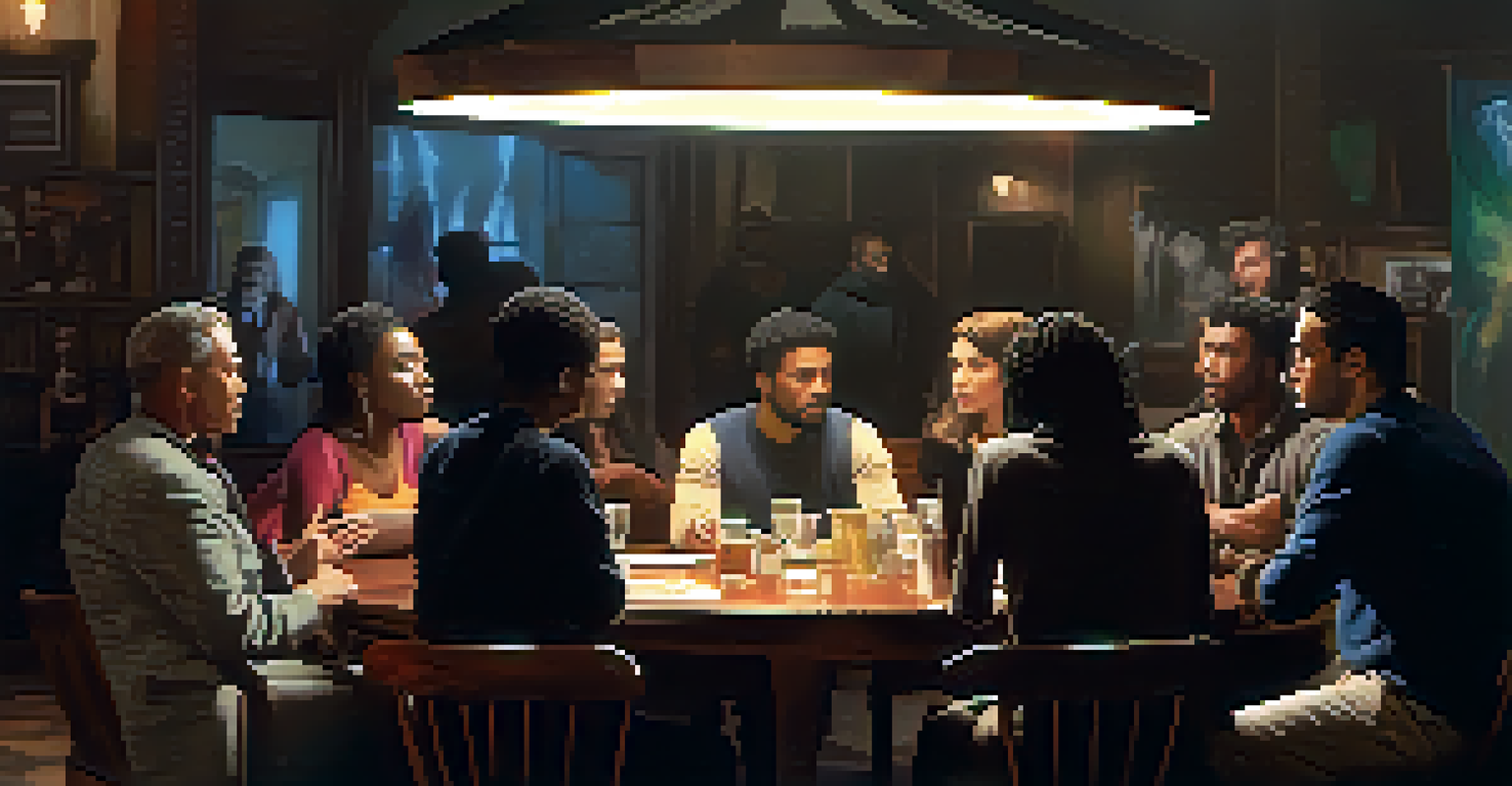Cinematic Antiheroes: A Reflection of Societal Values

Understanding the Antihero: More Than Just a Villain
The term 'antihero' refers to complex characters who often lack traditional heroic qualities, such as morality and nobility. Unlike conventional heroes, antiheroes may engage in morally ambiguous actions that challenge our perceptions of right and wrong. Think of characters like Walter White from 'Breaking Bad'—a high school chemistry teacher turned meth manufacturer, whose descent into crime reveals layers of desperation and ambition.
The greatest heroes are not those who have never fallen, but those who have risen after they fall.
Antiheroes resonate with audiences because they reflect our inner conflicts and societal struggles. In a world where black-and-white morality often feels oversimplified, these characters embody the gray areas of human nature. They invite us to question our own values and the systems that govern our lives, making them compelling and relatable.
Ultimately, the antihero serves as a mirror, reflecting the complexities of real-life dilemmas. As they navigate their flawed paths, we are prompted to consider what it means to be 'good' or 'bad' in a society rife with challenges. This nuanced portrayal of character challenges the traditional narrative, making us rethink our definitions of heroism.
Historical Context: The Rise of the Antihero in Cinema
The antihero's journey in cinema can be traced back to classic literature, but it gained significant traction during the 20th century. Films from the 1960s and 70s, such as 'Bonnie and Clyde' and 'Taxi Driver', introduced audiences to characters who defied societal norms and expectations. These films often reflected the tumultuous social landscape of their time, tapping into feelings of disillusionment and rebellion.

As society evolved, so did the portrayal of antiheroes in film. The gritty realism of the 1970s transitioned into the moral complexity of the 1990s and 2000s, giving rise to characters like Tony Soprano from 'The Sopranos' and Don Draper from 'Mad Men'. These characters thrived in morally ambiguous worlds, navigating personal and professional challenges that mirrored the anxieties of contemporary life.
Antiheroes Reflect Human Complexity
Antiheroes challenge our perceptions of morality and heroism, inviting audiences to explore the gray areas of human nature.
The evolution of the antihero reflects broader societal shifts, including changing attitudes towards authority, ethics, and personal freedom. As audiences grapple with their own values amidst global changes, the antihero's story becomes increasingly relevant, allowing us to explore the darker corners of human experience while still seeking understanding and empathy.
Cinematic Antiheroes and the Reflection of Modern Values
Today's cinematic antiheroes often embody societal values such as individualism, skepticism, and the quest for authenticity. Characters like Marvel's Deadpool and the Joker challenge traditional notions of heroism while simultaneously offering commentary on the absurdities of modern culture. Their narratives highlight the struggle for identity in a world that often feels chaotic and fragmented.
We are all the heroes of our own stories.
Moreover, these antiheroes frequently confront societal issues like mental health, poverty, and systemic injustice. By portraying flawed characters who grapple with these realities, filmmakers invite audiences to engage with uncomfortable truths about the world we live in. This connection fosters a sense of empathy, encouraging viewers to reflect on their own experiences and beliefs.
In essence, the antihero serves as a catalyst for dialogue about contemporary values and societal challenges. As we follow their journeys, we are compelled to examine our own moral frameworks, making antiheroes not just interesting characters, but essential reflections of our times.
Notable Antiheroes: Iconic Characters in Film History
Some antiheroes have become iconic figures in film, leaving a lasting impact on popular culture. Think of characters like Michael Corleone from 'The Godfather' or Tyler Durden from 'Fight Club'. These characters are not only memorable for their actions but also for the complex questions they raise about power, identity, and morality.
Each of these characters embodies specific societal fears and desires, making them relatable yet deeply flawed. Michael Corleone's transformation from a reluctant family member to a ruthless mafia boss reflects the corruptive nature of power, while Tyler Durden challenges consumerism and societal expectations through chaotic rebellion. Their stories resonate across generations, illustrating the timeless nature of the antihero archetype.
Evolution of Antiheroes in Film
The portrayal of antiheroes has evolved over time, mirroring societal shifts and reflecting contemporary values and struggles.
What makes these characters so compelling is their ability to evoke both admiration and revulsion. They challenge our perceptions and force us to grapple with uncomfortable truths, leading to engaging discussions about the nature of heroism and the human condition.
The Role of Antiheroes in Challenging Gender Norms
In recent years, female antiheroes have emerged, reshaping the landscape of cinema and challenging traditional gender roles. Characters like Villanelle from 'Killing Eve' and Amy Dunne from 'Gone Girl' offer complex portrayals of women who defy societal expectations and embrace their flaws. These characters prove that antiheroism is not limited by gender, enriching the narrative possibilities in film.
These female antiheroes often confront issues like misogyny, societal pressure, and personal ambition. By doing so, they challenge the audience's perceptions of femininity and power, inviting viewers to reevaluate their own biases. For instance, Villanelle's charm and ruthlessness highlight the contradictions of societal norms, while Amy Dunne's manipulation showcases the darker aspects of female agency.
The rise of female antiheroes not only diversifies storytelling but also reflects a shift in societal views toward women's roles. As these characters navigate their morally ambiguous journeys, they encourage discussions about gender dynamics and the complexities of female empowerment in contemporary society.
The Impact of Antiheroes on Audience Perception
Cinematic antiheroes significantly influence how audiences perceive morality and ethics. As viewers engage with these characters, they often find themselves empathizing with individuals who would typically be seen as villains. This connection can lead to a deeper understanding of the human experience, prompting audiences to reflect on their own moral compass.
Moreover, the portrayal of antiheroes can shape societal attitudes toward real-life issues. When characters like Frank Underwood from 'House of Cards' manipulate their way to power, viewers may begin to question the integrity of political systems and leadership. This critical lens encourages audiences to scrutinize societal structures and their implications on personal and collective morality.
Female Antiheroes Challenge Norms
The rise of female antiheroes reshapes cinematic narratives, pushing against traditional gender roles and encouraging discussions on empowerment.
As we witness the struggles and triumphs of antiheroes, we are reminded of the complexities of human behavior. This exploration allows us to confront our own biases and beliefs, fostering a more nuanced understanding of morality that transcends the simple dichotomy of good versus evil.
Conclusion: The Lasting Legacy of Cinematic Antiheroes
Cinematic antiheroes have carved out a unique niche in film history, reflecting the complexities of human nature and societal values. Their ambiguous morality challenges our perceptions of heroism, inviting us to engage with the gray areas of life. As audiences continue to embrace these complex characters, it becomes clear that the antihero is here to stay.
The legacy of antiheroes extends beyond entertainment; it encourages introspection and dialogue about morality, ethics, and societal norms. By navigating their flawed journeys, these characters inspire us to question our own beliefs and the systems that shape our lives. In doing so, they foster a deeper sense of understanding and empathy.

As we look to the future of storytelling, the continued evolution of the antihero will likely reflect the ongoing challenges and triumphs of society. By embracing the complexities of these characters, filmmakers can illuminate the human experience, reminding us that in our imperfections lie the seeds of growth and understanding.